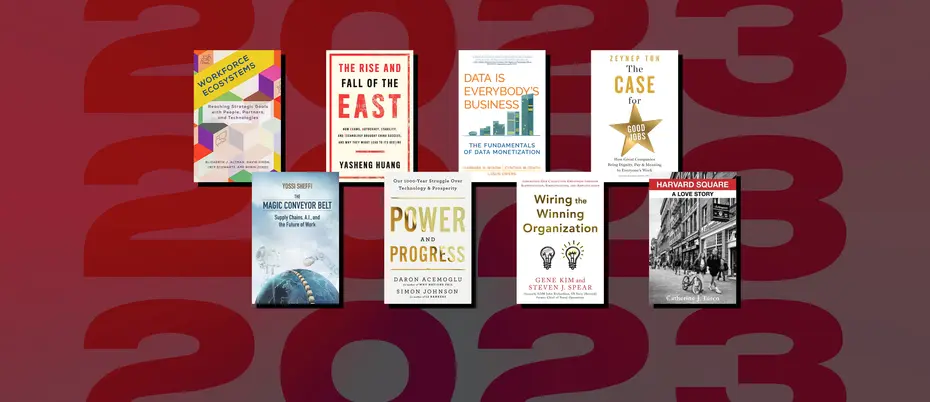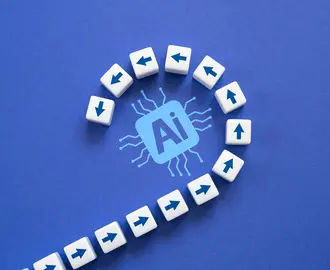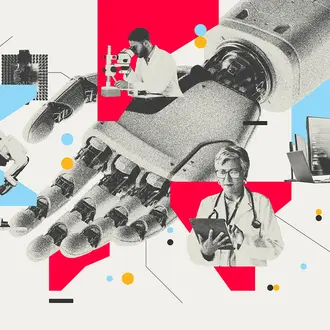Research
MIT Sloan reading list: 8 books from 2023
From artificial intelligence to supply chains to the future of China’s economy, these books help explain what’s happening in today’s business environment.
While the crown for 2023’s splashiest book debut goes to a man who is no stranger to royalty, the books on this year’s list of must-reads for leaders and managers are impressive in their own right.
Here are eight books from the MIT Sloan community that offer insights and explanations on topics ranging from data monetization to workforce ecosystems.
Power and Progress: Our Thousand-Year Struggle Over Technology and Prosperity
MIT economists and
In 18th century Britain, technical improvements in textile production generated great wealth for factory owners but created horrible working and living conditions for textile workers, who did not see their incomes rise for almost 100 years. Today, artificial intelligence and other digital technologies mesmerize the business elite while threatening to undermine jobs and democracy through excessive automation, massive data collection, and intrusive surveillance.
In their book, Acemoglu and Johnson decry the economic and social damage caused by the concentrated power of business and show how the tremendous computing advances of the past half century can become empowering and democratizing tools.
The Rise and Fall of the EAST: How Exams, Autocracy, Stability, and Technology Brought China Success, and Why They Might Lead to Its Decline
MIT Sloan professor
China’s economy is stagnating, plagued by a real-estate crisis, high unemployment, dwindling confidence among investors, and other setbacks. Some people might be surprised at the severity of these challenges, but in writing his book, Huang anticipated that China’s economy would falter.
According to Huang, the world is seeing a repeat of a period in Chinese history during which restrictions on economic and political freedom created economic stagnation. Huang’s bottom line: “Without academic collaboration, without business collaboration, without technological collaborations, the pace of Chinese technological progress is going to slow down dramatically.”
Workforce Ecosystems: Reaching Strategic Goals With People, Partners, and Technologies
MIT Initiative on the Digital Economy digital fellow Elizabeth J. Altman; MIT Sloan Management Review editorial director David Kiron; Jeff Schwartz; and Robin Jones
Workforce ecosystems need managers to ensure that everyone is functioning well together, but the key to a successful ecosystem isn’t management — it’s orchestration.
“Management” often implies or directly refers to control, the authors write. Orchestration, on the other hand, “conveys the idea that individual actors have agency or autonomy beyond the strictures imposed by HR and management fiat.”
In their book, Altman, Kiron, and their co-authors outline the essential parts of an orchestration framework, including leadership approaches, integration architectures, and technology enablers.
The Magic Conveyor Belt: Supply Chains, AI, and the Future of Work
Yossi Sheffi, MIT engineering professor and director of the MIT Center for Transportation and Logistics
Consumers rarely thought about supply chains before the pandemic; goods seemed to appear seamlessly in stores and on doorsteps. But pandemic-era disruptions lifted the curtain on this apparent magic, revealing “the underlying structure, unavoidable complexity, and massive scale of modern supply chains,” according to Sheffi.
In his book, Sheffi takes a close look at how supply chains operate and how new technologies might change them. One of his examples examines how bananas — the most frequently purchased grocery item in the U.S. — make their way from Costa Rica to Boston, where they appear on grocery store shelves as if from “supply chain Santa Claus and his elves.”
Wiring the Winning Organization: Liberating Our Collective Greatness Through Slowification, Simplification, and Amplification
Gene Kim and MIT Sloan senior lecturer
Organizations succeed when they design their processes, routines, and procedures to encourage employees to problem-solve and contribute to a common purpose. In their book, Spear and Kim suggest three mechanisms leaders can engage to hone employees’ problem-solving skills.
Slowification makes it easier to solve problems by pulling problem-solving out of the fast-paced and often unforgiving realm of performance. Simplification makes the problems themselves easier to solve by reshaping them: Large problems are deliberately broken down into smaller, simpler ones. And amplification makes it obvious that there are problems and makes it clear whether those problems have been seen and solved.
The Case for Good Jobs: How Great Companies Bring Dignity, Pay, and Meaning to Everyone’s Work
MIT Sloan professor of the practice
Almost a decade ago, Ton published “The Good Jobs Strategy,” which drew from 15 years of research on companies that offered good jobs while creating value for all of their stakeholders.
In her most recent book, Ton offers four operational choices managers can make to maintain a well-paid, well-trained workforce. They include:
- Focus and simplify. Maintain clarity about what value the business offers customers, and simplify flow and work to ensure that frontline workers can serve the customer well.
- Standardize and empower. Standardize routine processes to increase efficiency and consistency, and empower employees to engage in improvements that increase customer satisfaction.
Harvard Square: A Love Story
MIT Sloan associate professor
As a young girl, then a university student, and later a community advocate, Turco spent many hours in Harvard Square. As an economic sociologist, Turco uses the iconic Cambridge, Massachusetts, neighborhood as a backdrop to explore how street-level markets are a centrally important social institution in American life.
In her book, Turco traces the history of the square — which began as a 17th century open-air market — and weaves in the story of her own strong attachments to Harvard Square institutions like the Brattle Theater, Grendel’s Den, and Club Passim.
Data Is Everybody’s Business: The Fundamentals of Data Monetization
Barbara H. Wixom, Cynthia M. Beath, and Leslie Owens — all researchers affiliated with the MIT Center for Information Systems Research
Almost every organization recognizes the importance of data analytics by now. The next step is data monetization: turning data assets into money.
In their book, the authors draw from case studies, field observations, and a data research advisory board, to look at how organizations can use data not just to create benefits like higher customer satisfaction but also to “purposefully realize financial value — money — to improve their bottom line.”




